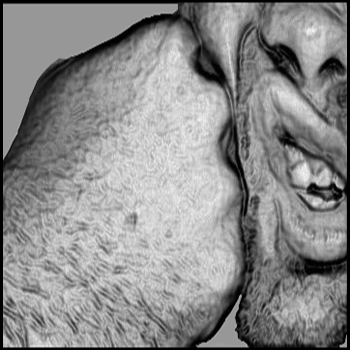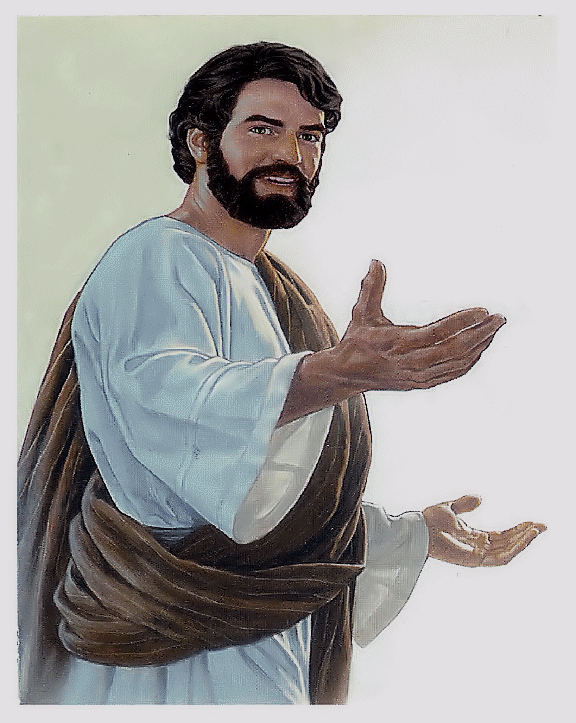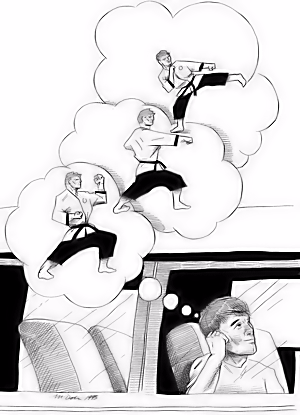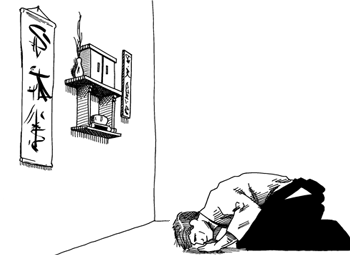
As a Christian and a martial artist,1 I am often asked two questions regarding my martial arts study and my faith. From nonbelievers (those who do not subscribe to "Biblical Christianity") I am asked how I reconcile the apparent conflict between martial arts training and Christ's admonition to turn the other cheek. My Christian family, on the other hand, want to know how I handle the religious, philosophical, mystical, and metaphysical aspects of the art. The first question reveals the general misunderstanding of Christ's teachings so common among nonbelievers. The second reveals a similar lack of understanding on the Christian's part. Although the "turning the other cheek" question is raised most often by my non-Christian friends,
it is just as misunderstood by my Christian brothers and sisters. Since Christians have the greater
difficulty with these issues, I will address them from the Christian perspective using frequent biblical references and examples. I will begin with what was for me the tougher of the two questions.
Turning the Other Cheek Kung-fu teaches that turning the other cheek to those whose ways of life are set in strength and violence is wrong. Such a passive attitude encourages lawlessness and injustice.
The idea of turning the other cheek, if not one of the more difficult teachings of Jesus to understand, is certainly one of the more difficult ones to observe – providing it is to be taken without qualification. From the gospel of Matthew, Chapter 5, verses 38 and 39, we read the following: You have heard that it was said, 'An eye for an eye, and a tooth for a tooth.' But I say to you, do not resist one who is evil. But if anyone strikes you on the right cheek, turn to him the other also. There are two ways we can interpret the command to turn the other cheek. The first is to interpret the text literally, asserting that it means exactly what it says. This would impose a duty of nonresistance on all men in all circumstances. One cannot, however, require the literal acceptance of verse 38 without also requiring the same of the other verses in that chapter – such as verses 29 and 30. Verse 29 reads, ". . . if your right eye causes you to sin, pluck it out," and verse 30 adds, ". . . if your right hand causes you sin, cut it off." Taking these verses literally, without qualification, can quickly lead one to institutionalized confinement! No. This literal, unqualified interpretation seems untenable. The other way to interpret the text is to say that it means exactly what it says, but with an understood
reservation for those cases that everyone would naturally assume to be exceptions. For example, when
I tell my children to be good, I do not have to tell them all of what that includes – i.e., don't burn
down the house, don't put the neighbor's car in the lake, and so on. Those things are understood.
This is a normal interpretation. C. S. Lewis, a popular Christian theologian, put it like this:
Does anyone suppose that our Lord's hearers understood him to mean that if a homicidal maniac, attempting to murder a third party, tried to knock me out of the way, I must stand aside and let him get his victim? I think it impossible that they could have so understood him. I believe the meaning of the words was perfectly clear – insofar as you are simply an angry man who has been hurt, mortify your anger and do not strike back. If, however, your motives are other than egoistic retaliation, then not only are you free to protect yourself and others; rather, it is your responsibility to do so. 3
The officer could have struck him anywhere, but a slap across the face is a common response to disrespectful speech. Assuming that Jesus was slapped across the face, we find no evidence of his voluntarily offering his other cheek for more. On the contrary, he asks why he deserved such unjust treatment. In the book of Acts, Chapter 16, we find that the apostle Paul took a similar stand. After being beaten and cast into prison unjustly, the Philippian magistrates decided that they would release Paul and his companions and forget the matter. To this Paul responded as follows in verse 37: They have beaten us publicly, uncondemned, men who are Roman citizens, and have thrown us into prison; and do they now cast us out secretly? No! Let them come themselves and take us out. Clearly, the Apostle Paul accepted no such injustice. This refutes the literal interpretation and supports the normal interpretation. The actions of Jesus and his apostle Paul indicate that there are times when the believer can and should resist evil and NOT offer the other cheek. The scriptures contain still other examples that support this. Paul, writing in the first epistle to Timothy, Chapter 5, verse 8 charges me, as a husband and father, with the following responsibility: "If any one does not provide for his relatives, and especially for his own family, he has disowned the faith and is worse than an unbeliever." Provision means more than just food, shelter, and clothing. It also includes safety, security, and protection from harm. Jesus, when telling his followers that they should always be ready for his return, illustrated his point by saying that his return would be as a "thief in the night"; that is, unexpected. In Matthew 24, verse 43, he adds, "But know this, that if the householder had known in what part of the night the thief was coming, he would have watched and not have let his house be broken into." While this verse refers directly to believers being ever ready for the Lord's return, it also clearly demonstrates that a man was rightly expected to defend his home and family from harm. There is one more, lesser known, verse we should look at. In the moments before Christ's arrest in the garden the following exchange took place between Jesus and his disciples: When I sent you out with no purse or bag or sandals, did you lack anything? They said, 'Nothing.' He said to them, But now, let him who has a purse take it, and likewise a bag. And let him who has no sword sell his mantle and buy one. (Luke 22:35-36) Moments later, as Jesus is arrested; Peter uses his sword to defend his master. In John's gospel, Chapter 18, verses 10 and 11, it is recorded as follows: Then Simon Peter, having a sword, drew it and struck the high priest's slave and cut off his right ear. The slave's name was Malchus. Jesus said unto Peter, 'Put up your sword in its sheath; shall I not drink the cup which the Father has given me?' Do these two accounts conflict? No. In the first account the Lord was telling his disciples that the time was coming when they would no longer receive hospitality and would have to provide for themselves including self-protection (the need for the sword). This does not conflict with John's account, because there Jesus does not tell Peter to get rid of his sword, but to put it in its sheath. The sword was, and still is, necessary. There in the garden, however, Peter would have used it counter to Christ's purpose. On the basis of Christ's teachings, is there really a conflict between Christian teaching and the study of
martial arts? No. Is the Christian attitude toward physical violence to be a passive one?
Again, the answer is no.
Religious Influences Today, a number of people devote their lives to martial arts study primarily for reasons of self-development. Through their practice of the martial arts, they seek to attain some glimpse of the "wisdom of the East" as set forth in the various philosophies of Taoism, Buddhism, and Zen. Karate-do, for example, means the way of karate. It is a journey that begins with the physical and ends with the spirit. The goal is to develop the spirit. How? Through physical karate training. This parallels the path of hatha-yoga, with its goal of self-purification through physical application. The incorporation of the contemplative, meditative, or philosophical aspects into the martial arts may have evolved as teachers began to see a need for morality in the art. As practitioners became increasingly capable of destruction, some form of control – some personal means of tempering physical conduct and actions – became necessary. Hence, moral codes like the Japanese code of Bushido evolved. For some, then, the martial arts offer a way that they hope will provide them with the wisdom to understand both themselves and the often unintelligible world in which they live. What they seek is a philosophy of life, a code to live by, a discipline – in an otherwise undisciplined world. For the Christian, using martial arts study for spiritual self-development fails for two reasons. First, from a practical standpoint, there are a variety of other avenues available to the individual wishing to study Eastern culture, thought, or philosophy to formulate a life credo (and without having to break a sweat doing it, either). Second, and more importantly, Asian martial arts philosophy is deeply entwined in Eastern mysticism and religion. As such, it is incompatible with Christian beliefs. However the philosophical and religious aspects of the martial arts are not necessary for developing the physical skills the martial arts student is seeking. Target shooting is, for many, an enjoyable pastime, but it is not without its dangers. Awareness and care are necessary to prevent injury. The same is true of everything we do, be it driving a car, cooking, using power tools – even watching television. Martial arts are no different. Christians must be aware of the inherent dangers in the study of Eastern martial arts; but that does not necessarily mean abstinence from physical martial arts training. The Christian martial artist must remove the religious overtones that are frequently taught as part of Eastern
martial arts. Instead, he should concentrate on skills that enhance mental concentration, improve
sensitivity to differing degrees of threat, and increase awareness of the interaction between attitude and
performance. This is learning the fine art of strategic thinking.
Meditation Scripture abounds with passages admonishing the believer to meditate on the Lord, meditate on his law,
meditate on his promises, and meditate on his Word. Thus, when told to use class time to meditate,
the Christian can do so. Not necessarily on what the instructor tells him to meditate on (if he
tells him anything). Not with the aim of emptying his mind (as in Zen mushin) or looking within
for some mystic power (such as centering in Transcendental Meditation), but purposefully and productively
busying it – focusing it outward and upward to the Creator God.
Bowing Practices Historically, bowing has been used to demonstrate an attitude of respect, reverence, and submission. In Oriental culture it is common for people to prostrate themselves on the ground before kings and princes. Such customs were also prevalent among the Hebrews. However, bowing is just as frequently noticed in scripture as an act of religious homage. No mention is made of posture, so we have no clear instruction as to whether it is of any significance if someone bows with his face to the ground (a common Eastern practice) or simply bows from the waist. This issue is not addressed because it is unimportant. It is not the posture that counts but the purpose. Bowing, as an act of religious homage, is addressed extensively in the Bible, and there is no doubt that bowing before any idol, spiritual leader or guide, or representative of a false god is prohibited. Joshua, in his last words to the elders of Israel, said the following: Do not associate with these nations that remain among you; do not invoke the names of their gods or swear by them. You must not serve them or bow down to them: (Joshua 23:7) This theme is repeated throughout scripture, so it is clear that bowing as an act of religious or spiritual homage is prohibited. So serious is this matter that the godly man finds even innocent association with such an act painful to his conscience. For example, Naaman is cleansed of his leprosy by God through His prophet Elisha. A highly regarded general of the king of Syria, Naaman says afterward that he will never again make burnt offerings and sacrifices to any other god save the Lord. However, he still has one problem. His master, the king of Syria, still worships his own god. The Syrian king was old and often took Naaman with him to lean on his arm when he went to worship. Naaman's words to Elisha reflect his predicament. Consider the following passage: But may the LORD forgive your servant for this one thing: When my master enters the temple of Rimmon to bow down and he is leaning on my arm and I bow also – when I bow down in the temple of Rimmon, may the LORD forgive your servant for this. Go in peace, Elisha said (2 Kings 5:18-19). Again, Naaman, was not worshiping this Syrian deity; his master was. He was not bowing down before Rimmon. He was only providing physical support for his master. However, Naaman found even this association was uncomfortable. What seems clear from all of this is that the act of bowing itself is not the problem. Rather, it is the purpose of such an act. Biblically, bowing before lawful authority and spiritual leaders (like the kings and prophets) was an accepted practice. For that reason alone I think one would be hard pressed to convince an Englishman he should not bow before his monarch. As for bowing before a school altar or shrine, if it is done as an act of obeisance or homage to some spiritual leader or guide, then for the Christian, the practice is prohibited and he must excuse himself from participation. If that is not possible (the bowing is required), then he should seek instruction elsewhere. There are many good schools where a Christian can train without having to involve himself in such practice. Suppose that bowing before the school shrine is simply a cultural tradition, a sign of respect for a place of learning, or just recognition of the efforts of past teachers – without any religious or spiritual significance. Is that all right?
In our school the only bowing we do is a type of mutual salute to begin and end our classes. It is not a bow of submission, obeisance, or homage. Rather, it is like an officer returning the salute of an enlisted man. As a fellow-student and training partner to those in class with me, we face our central wall of mirrors with myself lined up on the Beginner's end of the students present. With the words, "Bowing to our fellow-students and training partners," we come to "Attention" and then "Salute" (in a simple Chinese-style, right fist covered with left palm) — saluting those facing us in the mirrors (which rightly includes myself, the senior teaching student). It is, quite simply, mutual respect. Finally, those who would tell us to separate ourselves from the study of Asian martial arts because of
the general religious influences and overtones inherent there would do well to consider Christmas.
Christmas is not held on Christ's birthday, but on the birthday of the sun. (December 25 was the
first day after the winter solstice that the ancients could tell the days were getting longer.)
The Christmas tree, the boughs of holly, the Christmas wreath, and the Yule log are all pagan traditions
(and these are only a few). With that in mind, should not our response to the Christmas celebration
likewise be abstention? No. As with everything we do in life, awareness and understanding are
the keys.
Conclusion
|
|||||||||||||||||||
|
Notes and References • All quoted Scripture (not just the words of Jesus) is shown in red text.
Click here for my personal testimony. |
|
http://www.OrlandoKuntao.com
E-mail: ron@orlandokuntao.net |
Last update:
Aug. 6, 2016 by Bob Orlando |




